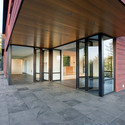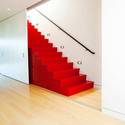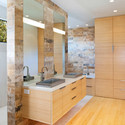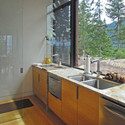
- Area: 3300 ft²
- Year: 2009
-
Photographs: Ben Benschneider
Text description provided by the architects. The house is sited on a forested hillside at the termination of a long steep winding road along Chuckanut Mountain. Only one location, a narrow ridge at the top of the property, provides level building surface. The tree line along this ridge opens to reveal stunning views of the San Juan Islands and the Skagit Valley below.
The house is a composition of spaces attached in a progression along a central linear spine— rooms are formed by a series of folded roof planes that envelop the interior spaces and separate to define the exterior spaces.

The series of varied experiences, the programmatic order, and the material selections were in response to both the site and the couple’s desire for the house to reflect their East Asian heritage and accommodate their family.

Design/Details
The clients voiced a desire for the house to reflect the marriage of their East Asian heritage: one being of Japanese descent the other of Chinese. Many elements of the design focus on this desire, including programmatic order and the material selection.
Upon entering the house a traditional Japanese grade level entry hall serves as a transition space where shoes and coats are removed before stepping up to the wood floors. Guest quarters are elevated to the north while the main path continues south. Proceeding south, the spine is flanked by a series of rooms (a hidden office, a side courtyard, a workout room, etc.) and a group of sliding doors that open to reveal a variety of functions including an office, a bar, and a Chinese red tansu stairway. This tansu provides access to the cantilevered bedroom suite above.

Additionally, due to a respiratory problem with one of the owners, there can be no frying or grilling in the kitchen, so a second work area with a dual fuel range and a sink is set behind a sliding glass panel and is equipped with a powerful vent.
In the Chinese family tradition, such as Chinese New Year, there are frequent gatherings of extended family and the need to feed 30 or more people on a given day. To address this, the living spaces open to each other with large sliding and folding doors to create the necessary space and circulation to accommodate a large group of people.

Green Elements/Materials
Sustainable systems for energy and water were desired in an effort to be environmentally responsible as well as to maintain functionality in this isolated location. Photovoltaic panels positioned at grade along the south slope provide the electrical power for the house. Well water is in short supply, so water is collected from the metal roofs, purified, and stored in tanks under the house and in a large tank to the north. Concern of forest fires as well as desire for longevity and minimal maintenance requirements dictated exterior cladding systems and material choices.




























